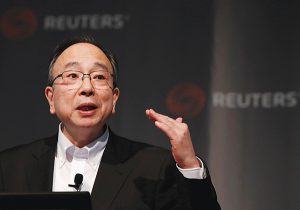Bloomberg
Two Bank of Japan (BOJ) veterans lead the field to replace Governor Haruhiko Kuroda next spring in a change of leadership at the central bank that risks upsetting global financial markets and spawning a renewed surge of speculation over possible policy change.
Most BOJ watchers surveyed by Bloomberg see current Deputy Governor Masayoshi Amamiya or his predecessor Hiroshi Nakaso as the most likely successors among a large group of possible contenders that includes former officials from the finance ministry and Japan’s securities watchdog.
Prime Minister Fumio Kishida will decide on his pick in coming months in what will number among the defining decisions of his administration as he battles against falling public support.
In the latest Bloomberg survey of BOJ watchers, Amamiya ranked as the favourite to replace Kuroda, with 30 votes out of 41 responses. Known as “Mr. BOJ†or the “emperor†of the central bank, Amamiya has long played the key role of re-imagining policy to match the changing circumstances of the time.
Bold examples of the deputy governor’s policymaking resourcefulness are the “shock and awe†quantitative easing first championed by Kuroda and the yield curve control framework that gave Kuroda’s stimulus more sustainability. He also worked with the previous governor Masaaki Shirakawa, whose policy was often criticised for being “too little, too late.â€
That suggests Amamiya, if selected, won’t simply be a continuation of Kuroda. He will likely keep policy flexible and respond to the economic conditions and outlook he encounters next year and beyond.
Nakaso is chairman of Daiwa Institute of Research and is spearheading Tokyo’s efforts to position itself as a key financial hub in Asia and efforts to promote green financing. Nakaso served as deputy BOJ governor during Kuroda’s first term, showing he is no stranger to ambitious stimulus efforts.
Former BOJ Board Member Makoto Sakurai expects Nakaso would place more importance on long run health of financial system given his background.
He is also known for his fire-fighting efforts during the global financial crisis and in a 740-page book published earlier this year he gives vivid descriptions of his intense fight as a central banker during Japan’s near-financial meltdown in the late 1990s. Nakaso has chaired study groups at the Bank for International Settlements and the Group of 20 and has close ties with many global central bankers.
Former BOJ Board Member Makoto Sakurai expects Nakaso would place more importance on the long run health of the financial system given his background. Nakaso said in September that the BOJ has done more than its fair share and that “too much burden was placed on monetary policy.â€
 The Gulf Time Newspaper One of the finest business newspapers in the UAE brought to you by our professional writers and editors.
The Gulf Time Newspaper One of the finest business newspapers in the UAE brought to you by our professional writers and editors.
